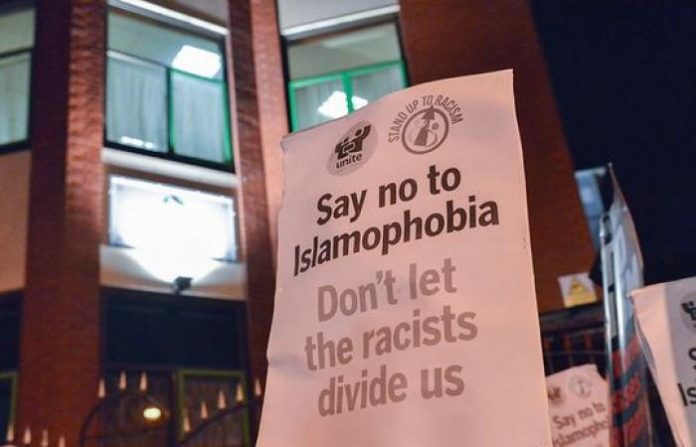By Mohib Ahmad, TwoCircles.net
Hate crimes against Indian Muslims had skyrocketed after BJP stalwart Narendra Modi came to power in 2014, gaining more fuel after his landslide victory in 2019. This year, the biggest communal carnage so far happened around the Delhi assembly elections, just two months back. The Capital was rocked by targeted anti-Muslim violence killing 53and injuring hundreds. Victims include 22-year-old Ashfaq Hussain who had got married on Valentine’s Day and murdered just ten days later with five bullet wounds to his young body. Also killed was 85-year-old Akberi, who was too old to run when her house was set on fire by a bloodthirsty mob. The violence continued unchecked for two days without much resistance from the Delhi Police that reports up to the Home Minister of India, Amit Shah. At least 16 mosques across northeast Delhi were attacked, copies of Quran burnt and, gas cylinders were used to cause maximum damage.
None of this is happening in a vacuum but is enabled by an insidious propaganda campaign against Muslims, supporters of which live not just in India but outside as well. In this month only, multiple reports of Indian residents in the UAE spreading Islamophobic rhetoric have surfaced on social media. One Hindu employee was sacked and two others are facing legal troubles for promoting Islamophobic messages. On Twitter, Princess Hend Al Qassimi highlighted anti-Muslim messages of yet another Hindu resident and other notable figures in the region took cognizance as well. Amidst a growing backlash, the ambassador to the UAE was forced to put out a statement advising Indian nationals not to indulge in such activities.
There are over 3 million Indians living in the UAE of which majority are Hindus. While most of them are peace-loving and hard-working having contributed immensely to development, yet, there are some who use resources and influence they have built to spread propaganda and hate speech. Both Amit Shah and Narendra Modi belong to India’s ruling party, the BJP, but had started their careers in the Rashtriya Swayamsevak Sangh (RSS), a militant organization that leads the larger Hindutva movement. Modi’s electoral triumphs have brought to mainstream the deep-seated hatred many Hindutva followers have felt towards Muslims. It is increasingly clear that some Indian Hindus who live in foreign countries such as the UAE ascribe to the same ideology.
It is important to note the hatred towards Indian Muslims stems from anti-Arab and Islamophobic sentiments. In a revealing moment in 2017, Modi had remarked that the vision of Hamid Ansari, the outgoing vice president of India is limited because he spent most of his time as a diplomat in Muslim countries, including UAE and Saudi Arabia. He posited that Ansari’s experience working among Muslims hindered his ability to perform constitutional duties. These convictions that otherize Muslims are deeply rooted in the Hindutva ideology. Vinayak Savarkar, the progenitor of the movement appropriated India as pitrabhumi (fatherland) and punyabhumi (holy land) for Hindus. With their holy places elsewhere, Muslims and Christians are considered “misfits who could not truly be a part of the nation”. In the collective imagination of the Hindutva movement, Arabs are invaders who brought Islam to India and most Muslims in India were forcibly converted into Islam therefore needing them brought back to Hinduism through a campaign called gharwapsi (back to home).
This unabated popularizing of the ideology through mass media, films, TV series, prime time debates and social media, in addition to Modi’s electoral success has emboldened his followers at home and abroad to spread their Islamophobic messages with impunity. When Modi had first visited the UAE in 2015, he was greeted by a crowd of 40,000. Be it Houston or Dubai, some of his most enthusiastic supporters are non-resident Indians. It is unfortunate but the extremist Hindus in UAE are drinking from the same well of hate as their ideological brethren in India that spreads the Hindutva world view otherizing and dehumanizing Muslims.
After his emphatic re-election in 2019, the UAE awarded Modi with its highest civilian honor. As if on cue, he barreled through parliament the Citizenship Amendment Act (CAA), a blatantly anti-Muslim piece of legislation to reduce Muslims to second class citizens. Despite nationwide protests, the BJP sees no reason to correct its course because in his mind, it has its own rewards.
But UAE that aligns with its Vision 2020, is a wealthy, powerful Muslim country that has a significant Hindu population and it becomes a moral imperative for it to combat Islamophobia – locally and globally. It should start by providing sensitivity training about Islam to all foreign workers. The training could either be part of the visa approval process ordelegated to HR departments in individual companies. Also, creating a basic framework in schools that highlights the contribution of Muslims and Arabs to mathematics, science, arts and culture would help address propaganda and prejudice.
Additionally, the UAE should work closely with its Hindu religious and community leaders to ensure hate speech isn’t normalized. UAE had passed a legislation in 2015 that outlaws all religious or racial discrimination. It should be accompanied by a public relations and community outreach campaign that addresses some of the stereotypes against Muslims while emphasizing legal repercussions for the violators. Emirati political and business leaders as well as reputed civic leaders should be engaged as part of that campaign. If there are acts of violence in India against Muslims, Hindu leaders in UAE have a responsibility to speak out.
In a country with more than 80% of its population born outside the country, UAE has been incredibly welcoming to foreigners, irrespective of race or religion. As UAE gets ready to usher into its golden jubilee, it has the opportunity to exemplify the “spirit of religious tolerance” and “mutual understanding and acceptance” to the world.
Mohib Ahmad is an Indian-American Muslim living in Austin, TX. He co-hosts The Indian Muslims Podcast at www.indianmuslims.in.


